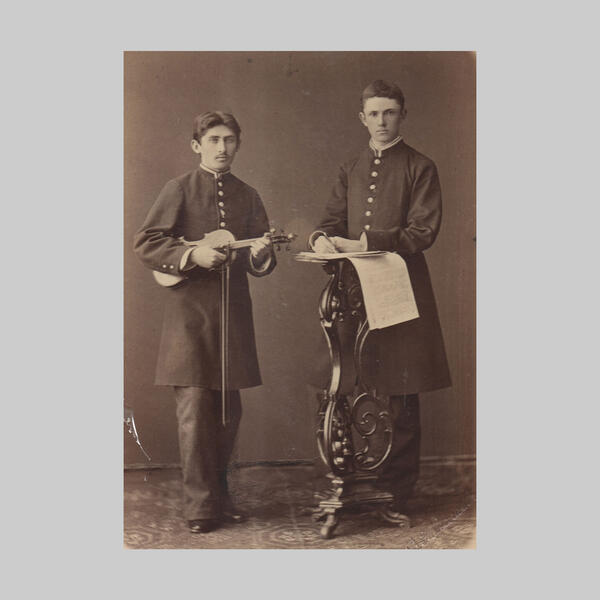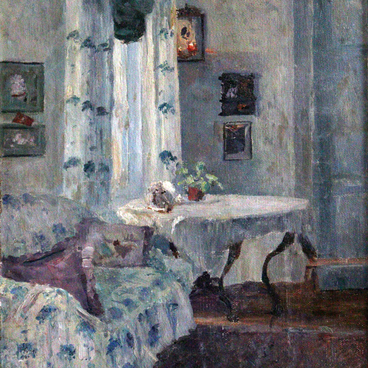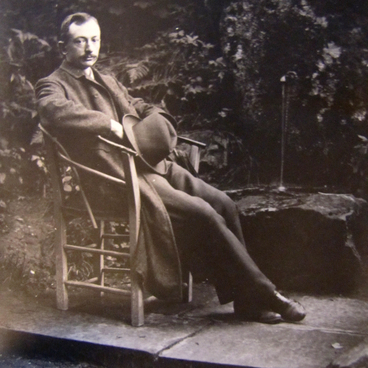Nikolay Chicherin was born in Paris. From France, the family returned to Russia, to the family estate Pokrovskoe. From childhood, the child showed outstanding musical abilities and received serious training in music theory, composition and playing several instruments: the grand piano, violin and flute.
In 1886, Chicherin graduated with a gold medal from the Tambov Provincial Men’s Gymnasium, then from the Law Faculty of St. Petersburg University with a 1st degree diploma.
In 1893, by order of the Ministry of Justice, he was assigned to serve in the office of the 2nd Department of the Governing Senate as a collegiate secretary.
Successfully moving up the career ladder, Chicherin rose to the rank of State Councilor by 1917. From 1895 to 1914, he was repeatedly elected by the Kozlov district zemstvo assembly to the positions of district and provincial councilors, a honorary magistrate.
After the death of his father, Nikolay Chicherin, together with his sister Sofia and brother Georgy, inherited the estate in Tambov and the Pokrovskoe estate in the Kozlovsky district of the Tambov province. In 1909, he became the sole owner of the estate.
Nikolay and Sofia Chicherina paid a lot of attention to the Pokrovskoe School, where children were taught the Law of God, literacy, arithmetic, and various crafts. Chicherin himself conducted choral classes here. In 1895, a graduate of the Kozlovsky boarding house Natalya Govorova, the daughter of a priest from the village of Olshanka, the Borisoglebsk district, Tambov province, became their employee and a close friend. In 1903, she married Nikolay Chicherin. In 1904, they had their first-born daughter, Sofia, who later became a famous composer of the Leningrad school.
After the nationalization of the Pokrovskoe estate in 1918, the family of Nikolai Chicherin moved to the city of Kozlov (now Michurinsk). There his musical and educational activities were most clearly manifested. He taught singing in local schools, gave home lessons, led choir and music circles, and organized lectures and concerts from the works of his favorite composers. These concerts were very successful. In Kozlov, Chicherin had many talented students who later became professional musicians.
In 1925, the family moved to Leningrad. There Chicherin taught music in schools for four years and retired in 1929. Until his last days he attended almost all concerts and witnessed the rich musical life of the city. In 1939, Nikolai Chicherin died of pneumonia, he was buried in Leningrad at the Volkov cemetery.
In 1886, Chicherin graduated with a gold medal from the Tambov Provincial Men’s Gymnasium, then from the Law Faculty of St. Petersburg University with a 1st degree diploma.
In 1893, by order of the Ministry of Justice, he was assigned to serve in the office of the 2nd Department of the Governing Senate as a collegiate secretary.
Successfully moving up the career ladder, Chicherin rose to the rank of State Councilor by 1917. From 1895 to 1914, he was repeatedly elected by the Kozlov district zemstvo assembly to the positions of district and provincial councilors, a honorary magistrate.
After the death of his father, Nikolay Chicherin, together with his sister Sofia and brother Georgy, inherited the estate in Tambov and the Pokrovskoe estate in the Kozlovsky district of the Tambov province. In 1909, he became the sole owner of the estate.
Nikolay and Sofia Chicherina paid a lot of attention to the Pokrovskoe School, where children were taught the Law of God, literacy, arithmetic, and various crafts. Chicherin himself conducted choral classes here. In 1895, a graduate of the Kozlovsky boarding house Natalya Govorova, the daughter of a priest from the village of Olshanka, the Borisoglebsk district, Tambov province, became their employee and a close friend. In 1903, she married Nikolay Chicherin. In 1904, they had their first-born daughter, Sofia, who later became a famous composer of the Leningrad school.
After the nationalization of the Pokrovskoe estate in 1918, the family of Nikolai Chicherin moved to the city of Kozlov (now Michurinsk). There his musical and educational activities were most clearly manifested. He taught singing in local schools, gave home lessons, led choir and music circles, and organized lectures and concerts from the works of his favorite composers. These concerts were very successful. In Kozlov, Chicherin had many talented students who later became professional musicians.
In 1925, the family moved to Leningrad. There Chicherin taught music in schools for four years and retired in 1929. Until his last days he attended almost all concerts and witnessed the rich musical life of the city. In 1939, Nikolai Chicherin died of pneumonia, he was buried in Leningrad at the Volkov cemetery.



